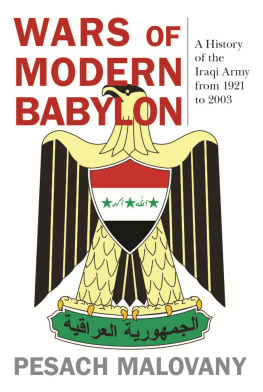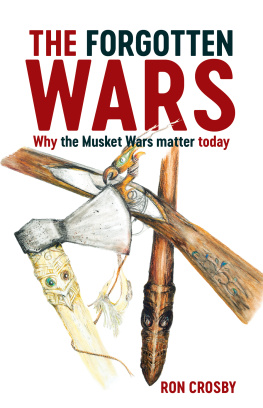
Wars of Modern Babylon
FOREIGN MILITARY STUDIES
History is replete with examples of notable military campaigns and exceptional military leaders and theorists. Military professionals and students of the art and science of war cannot afford to ignore these sources of knowledge or limit their studies to the history of the U.S. armed forces. This series features original works, translations, and reprints of classics outside the American canon that promote a deeper understanding of international military theory and practice.
The Institute for Advanced Military Thinking (IAMT) was formed by retired senior officers of the Israel Defense Forces to serve as a bridge between the theories and policies of the academic world and the doctrine, training, and other preparations required for field operations. The IAMT applies this approach across the full spectrum of future land warfare by:
initiating and supporting joint discussions regarding the historical lessons offered by land warfare in the Middle East;
encouraging innovative thinking and open debate about current critical defense issues;
supporting decision makers as they prepare for future challenges.
SERIES EDITORS: Roger Cirillo and Gideon Avidor

An AUSA Book
Wars of Modern Babylon
A History of the Iraqi Army from 1921 to 2003
Col. Pesach Malovany, IDF (Ret.)
Introductions by Amatzia Baram and Kevin M. Woods
Forewords by Lt. Gen. Amnon Lipkin-Shahak, IDF (Ret.), and Maj. Gen. Yaakov Amidror, IDF (Ret.)
Translated from Hebrew by Ronna Englesberg

Copyright 2017 by The University Press of Kentucky
Scholarly publisher for the Commonwealth,
serving Bellarmine University, Berea College, Centre
College of Kentucky, Eastern Kentucky University,
The Filson Historical Society, Georgetown College,
Kentucky Historical Society, Kentucky State University,
Morehead State University, Murray State University,
Northern Kentucky University, Transylvania University,
University of Kentucky, University of Louisville,
and Western Kentucky University.
All rights reserved.
Editorial and Sales Offices: The University Press of Kentucky
663 South Limestone Street, Lexington, Kentucky 40508-4008
www.kentuckypress.com
Cataloging-in-Publication data available from the Library of Congress
ISBN 978-0-8131-6943-9 (hardcover : alk. paper)
ISBN 978-0-8131-6944-6 (pdf)
ISBN 978-0-8131-6945-3 (epub)
This book is printed on acid-free paper meeting
the requirements of the American National Standard
for Permanence in Paper for Printed Library Materials.

Manufactured in the United States of America.

| Member of the Association of American University Presses |
Contents
by Amnon Lipkin-Shahak
by Yaakov Amidror
by Kevin M. Woods
by Amatzia Baram
Maps
.
Foreword
In this book, Pesach Malovany has created a fascinating mosaic of the Iraqi Army and of a world that once was, but has ceased to exist. By doing so he affords sharp, profound insights into the factors that led to the disintegration of that world. This was the world of the Iraqi regime under the leadership of the dictator Saddam Hussein, which may be seen clearly through the prism of the army, its structure, internal balance of power, and position in Iraqi society. The text makes an important contribution to understanding these processes in the past, the present, and the possible future.
By depicting the Iraqi Army and the broader picture reflected by it through painstaking, exhaustive research, Pesach Malovany has created a masterwork that yet again demonstrates that the intelligence officer, apparently a passive bystander, must possess patience, discernment, diagnostic ability, sophisticated information-gathering techniques, and analytical skill. All these elements might be attainable by others, but not everyone has the ability to fit all the pieces of the puzzle into a fascinating, significant whole that contributes greatly to comprehending the reality of the world as it is.
Wars of Modern Babylon is the first document of its kind, drawing a portrait of an Arab army from its own point of view, as it chooses to present itself. Such a text has even more importance and validity when it focuses on the army of a country that has made a superhuman effort to arm itself with unconventional weaponry, including long-range missiles that have on occasion been directed at the State of Israel, turning it into an imminent regional threat.
Colonel (Ret.) Pesach Malovany is a senior intelligence analyst who served for many years in the collection and research units of the Intelligence Corps, the fruits of whose labors I enjoyed in my capacity as a former Director of Military Intelligence.
Lt. Gen. (Ret.) Amnon Lipkin-Shahak
Former Director of Military Intelligence
and Chief of the General Staff, Israel Defense Forces 2010
Foreword
After having disappeared from the world as a result of the Second Gulf War, the Iraqi Army has been bestowed a worthy memorial. Colonel (Ret.) Pesach Malovany, a veteran researcher of Iraq in general, and of its army in particular, has painstakingly collected every scrap of information that it has been possible to obtain regarding this huge army, which for many years was the driving force behind the Eastern Front threatening Israels security.
The Iraqi Army played an important role in two of Israels wars (although, despite its efforts, not in the Six-Day War):
A. The War of Independence: As part of the Eastern Front that (as uncoordinated as it was) included the armies of Transjordan, Iraq, and Syria, which attacked along the entire length of the border between the Dead Sea and the Upper Galilee. The Iraqi Army initially attacked in the center (the Jordan Valley area) in the direction of Kochav Hayarden, and toward the town of Afula. After the initial phase of the fighting (which did not yield any real results), the Iraqi forces were transferred to the area of Qalqilya-Jenin, and were responsible in no small part for the fact that the waist of the State of Israel remained very narrow in the vicinity of Kfar Yona, as well as the failure of the IDF to conquer the Jenin area. The Iraqi Army retreated at the wars end, but Iraq, unlike the immediate neighbors of the newly created State of Israel, never signed a ceasefire agreement with Israel, and the state of war between the two nations never formally ended.
B. The Yom Kippur War: Twenty-five years later, the Iraqi Army came to the aid of the Syrian Army, which was withstanding with difficulty an IDF counterattack on the Golan Heights. It is possible that without that aid, which surprised the IDF at its major breakthrough point (the Laner Division sector) when the Syrian Army was in retreat under the pressure of Israeli attack, the war would have ended with a much greater Syrian defeat, and the IDF might have succeeded in totally decimating the Syrian forces and reaching the outskirts of Damascus.
Next page














